Company Law Assignment: Replaceable Rules and Liability
VerifiedAdded on 2023/02/01
|6
|1776
|76
Homework Assignment
AI Summary
This assignment explores core concepts in company law, focusing on the establishment of limited liability companies, the significance of separate legal personality as established in *Salmon v. Salomon*, and the implications of limited liability for shareholders, referencing the Corporations Act 2001. It then delves into the role of 'replaceable rules' as defined in section 141 of the Corporations Act 2001, detailing their function in regulating company activities, protecting minority shareholders, and supplementing company constitutions, including how they can be adopted and altered. Finally, the assignment examines the duties of company directors, as outlined in statute, equity doctrines, and common law, including the duty of care and diligence (section 180 of the Corporations Act), the proper use of information (section 183), and the avoidance of conflicts of interest. The assignment highlights the distinctions between executive and non-executive directors, emphasizing the varying standards of care expected based on their roles and levels of company involvement, with references to key case law such as *ASIC v. MacDonald* and *Whitehouse v. Carlton Hotel Pty Ltd*.
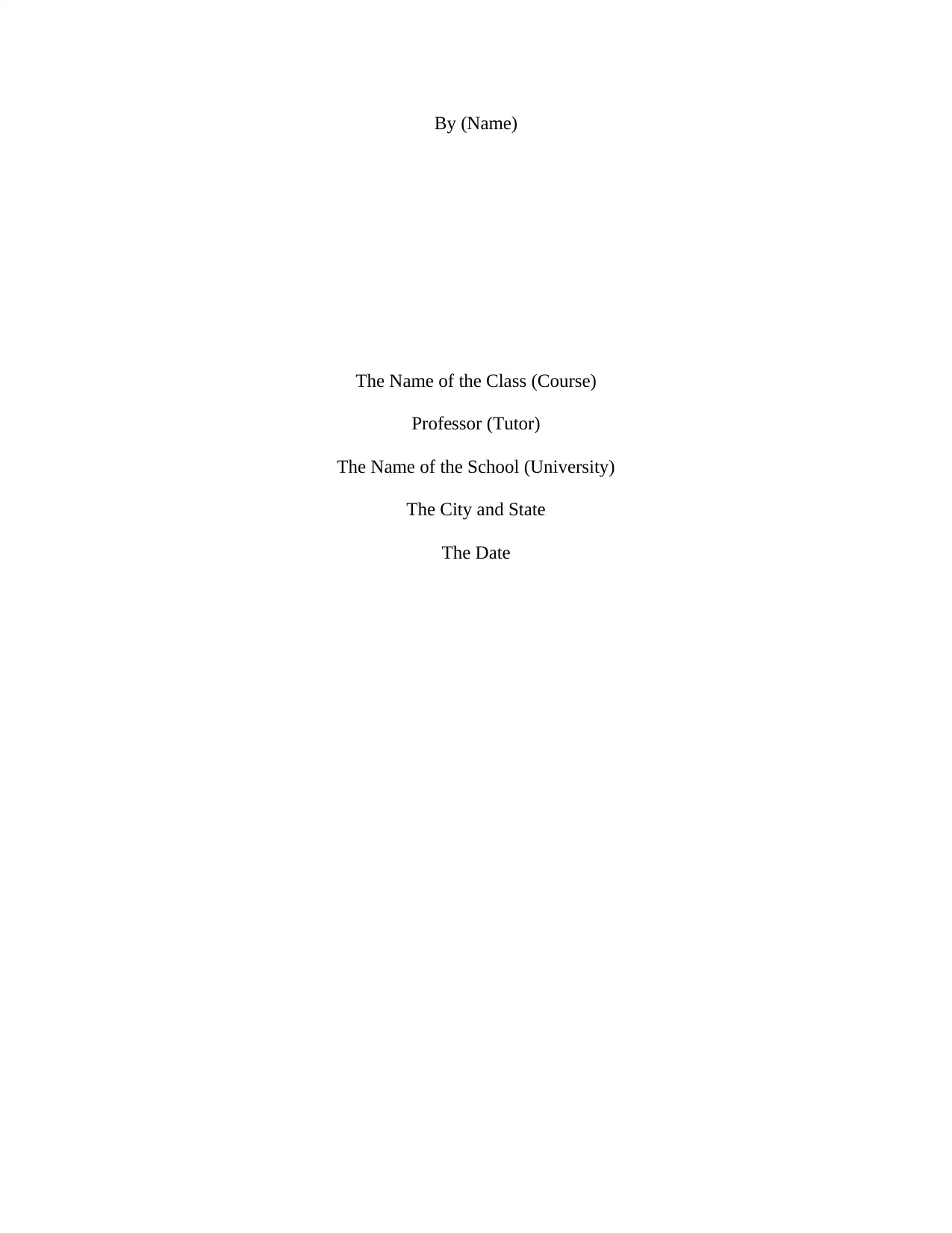
By (Name)
The Name of the Class (Course)
Professor (Tutor)
The Name of the School (University)
The City and State
The Date
The Name of the Class (Course)
Professor (Tutor)
The Name of the School (University)
The City and State
The Date
Paraphrase This Document
Need a fresh take? Get an instant paraphrase of this document with our AI Paraphraser
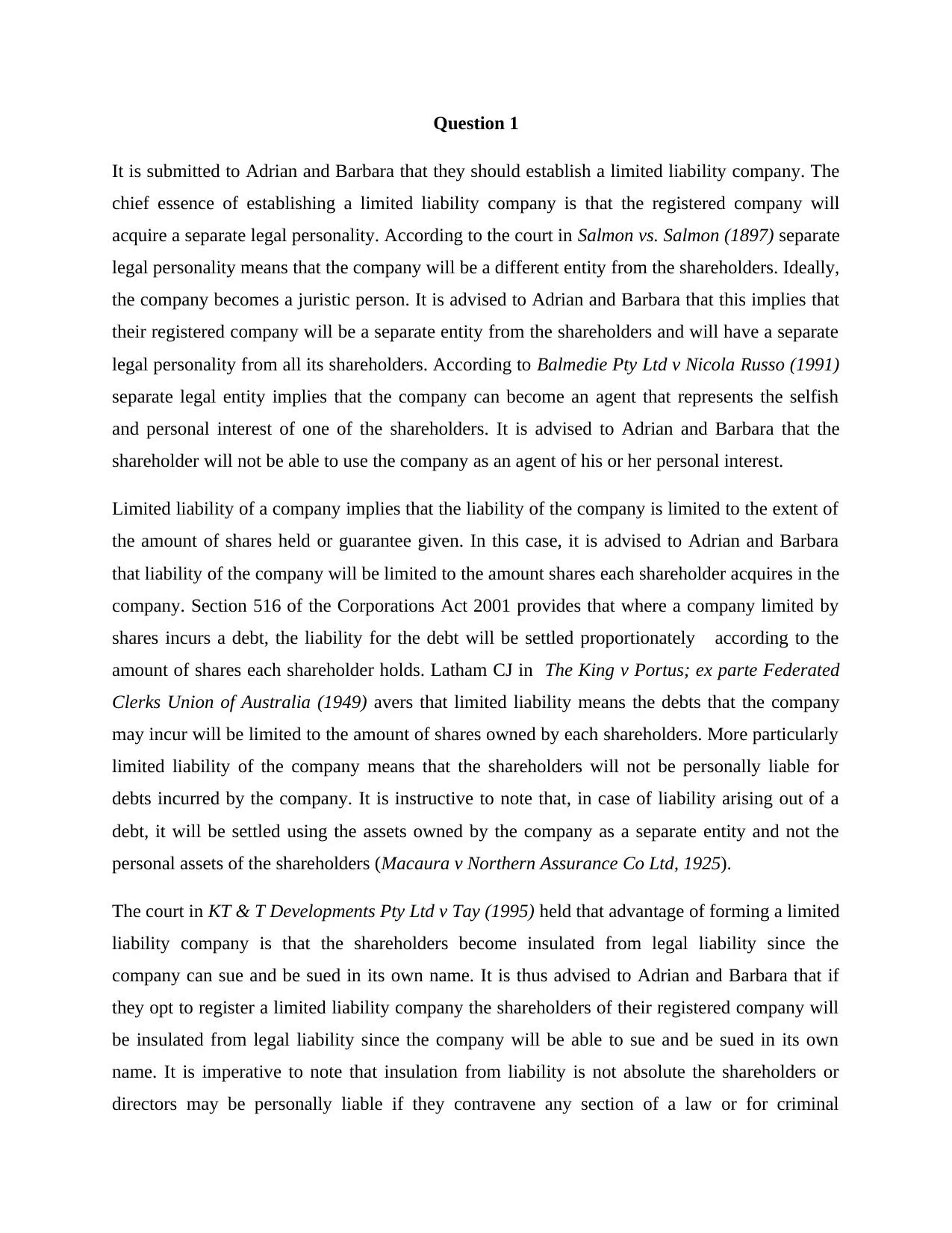
Question 1
It is submitted to Adrian and Barbara that they should establish a limited liability company. The
chief essence of establishing a limited liability company is that the registered company will
acquire a separate legal personality. According to the court in Salmon vs. Salmon (1897) separate
legal personality means that the company will be a different entity from the shareholders. Ideally,
the company becomes a juristic person. It is advised to Adrian and Barbara that this implies that
their registered company will be a separate entity from the shareholders and will have a separate
legal personality from all its shareholders. According to Balmedie Pty Ltd v Nicola Russo (1991)
separate legal entity implies that the company can become an agent that represents the selfish
and personal interest of one of the shareholders. It is advised to Adrian and Barbara that the
shareholder will not be able to use the company as an agent of his or her personal interest.
Limited liability of a company implies that the liability of the company is limited to the extent of
the amount of shares held or guarantee given. In this case, it is advised to Adrian and Barbara
that liability of the company will be limited to the amount shares each shareholder acquires in the
company. Section 516 of the Corporations Act 2001 provides that where a company limited by
shares incurs a debt, the liability for the debt will be settled proportionately according to the
amount of shares each shareholder holds. Latham CJ in The King v Portus; ex parte Federated
Clerks Union of Australia (1949) avers that limited liability means the debts that the company
may incur will be limited to the amount of shares owned by each shareholders. More particularly
limited liability of the company means that the shareholders will not be personally liable for
debts incurred by the company. It is instructive to note that, in case of liability arising out of a
debt, it will be settled using the assets owned by the company as a separate entity and not the
personal assets of the shareholders (Macaura v Northern Assurance Co Ltd, 1925).
The court in KT & T Developments Pty Ltd v Tay (1995) held that advantage of forming a limited
liability company is that the shareholders become insulated from legal liability since the
company can sue and be sued in its own name. It is thus advised to Adrian and Barbara that if
they opt to register a limited liability company the shareholders of their registered company will
be insulated from legal liability since the company will be able to sue and be sued in its own
name. It is imperative to note that insulation from liability is not absolute the shareholders or
directors may be personally liable if they contravene any section of a law or for criminal
It is submitted to Adrian and Barbara that they should establish a limited liability company. The
chief essence of establishing a limited liability company is that the registered company will
acquire a separate legal personality. According to the court in Salmon vs. Salmon (1897) separate
legal personality means that the company will be a different entity from the shareholders. Ideally,
the company becomes a juristic person. It is advised to Adrian and Barbara that this implies that
their registered company will be a separate entity from the shareholders and will have a separate
legal personality from all its shareholders. According to Balmedie Pty Ltd v Nicola Russo (1991)
separate legal entity implies that the company can become an agent that represents the selfish
and personal interest of one of the shareholders. It is advised to Adrian and Barbara that the
shareholder will not be able to use the company as an agent of his or her personal interest.
Limited liability of a company implies that the liability of the company is limited to the extent of
the amount of shares held or guarantee given. In this case, it is advised to Adrian and Barbara
that liability of the company will be limited to the amount shares each shareholder acquires in the
company. Section 516 of the Corporations Act 2001 provides that where a company limited by
shares incurs a debt, the liability for the debt will be settled proportionately according to the
amount of shares each shareholder holds. Latham CJ in The King v Portus; ex parte Federated
Clerks Union of Australia (1949) avers that limited liability means the debts that the company
may incur will be limited to the amount of shares owned by each shareholders. More particularly
limited liability of the company means that the shareholders will not be personally liable for
debts incurred by the company. It is instructive to note that, in case of liability arising out of a
debt, it will be settled using the assets owned by the company as a separate entity and not the
personal assets of the shareholders (Macaura v Northern Assurance Co Ltd, 1925).
The court in KT & T Developments Pty Ltd v Tay (1995) held that advantage of forming a limited
liability company is that the shareholders become insulated from legal liability since the
company can sue and be sued in its own name. It is thus advised to Adrian and Barbara that if
they opt to register a limited liability company the shareholders of their registered company will
be insulated from legal liability since the company will be able to sue and be sued in its own
name. It is imperative to note that insulation from liability is not absolute the shareholders or
directors may be personally liable if they contravene any section of a law or for criminal
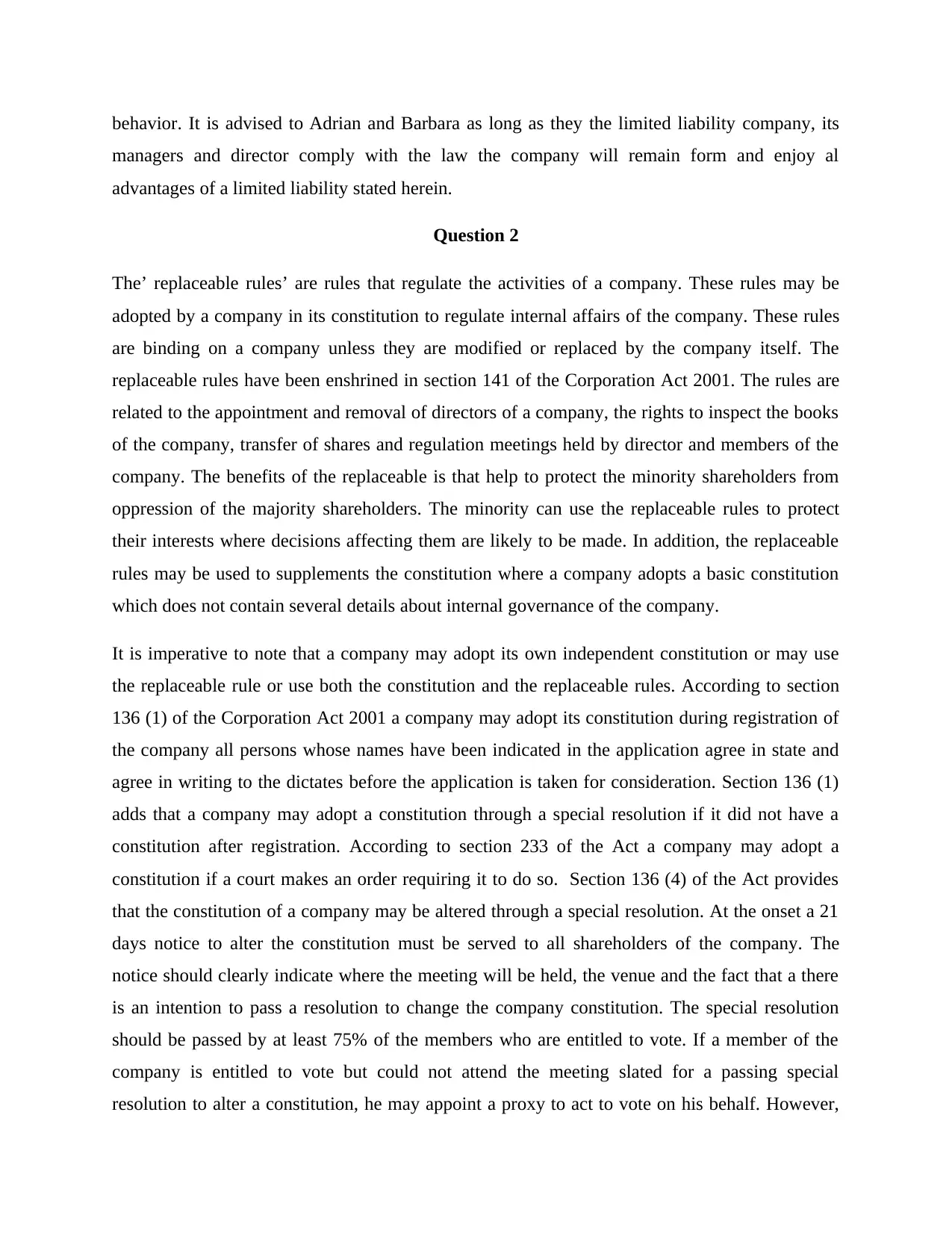
behavior. It is advised to Adrian and Barbara as long as they the limited liability company, its
managers and director comply with the law the company will remain form and enjoy al
advantages of a limited liability stated herein.
Question 2
The’ replaceable rules’ are rules that regulate the activities of a company. These rules may be
adopted by a company in its constitution to regulate internal affairs of the company. These rules
are binding on a company unless they are modified or replaced by the company itself. The
replaceable rules have been enshrined in section 141 of the Corporation Act 2001. The rules are
related to the appointment and removal of directors of a company, the rights to inspect the books
of the company, transfer of shares and regulation meetings held by director and members of the
company. The benefits of the replaceable is that help to protect the minority shareholders from
oppression of the majority shareholders. The minority can use the replaceable rules to protect
their interests where decisions affecting them are likely to be made. In addition, the replaceable
rules may be used to supplements the constitution where a company adopts a basic constitution
which does not contain several details about internal governance of the company.
It is imperative to note that a company may adopt its own independent constitution or may use
the replaceable rule or use both the constitution and the replaceable rules. According to section
136 (1) of the Corporation Act 2001 a company may adopt its constitution during registration of
the company all persons whose names have been indicated in the application agree in state and
agree in writing to the dictates before the application is taken for consideration. Section 136 (1)
adds that a company may adopt a constitution through a special resolution if it did not have a
constitution after registration. According to section 233 of the Act a company may adopt a
constitution if a court makes an order requiring it to do so. Section 136 (4) of the Act provides
that the constitution of a company may be altered through a special resolution. At the onset a 21
days notice to alter the constitution must be served to all shareholders of the company. The
notice should clearly indicate where the meeting will be held, the venue and the fact that a there
is an intention to pass a resolution to change the company constitution. The special resolution
should be passed by at least 75% of the members who are entitled to vote. If a member of the
company is entitled to vote but could not attend the meeting slated for a passing special
resolution to alter a constitution, he may appoint a proxy to act to vote on his behalf. However,
managers and director comply with the law the company will remain form and enjoy al
advantages of a limited liability stated herein.
Question 2
The’ replaceable rules’ are rules that regulate the activities of a company. These rules may be
adopted by a company in its constitution to regulate internal affairs of the company. These rules
are binding on a company unless they are modified or replaced by the company itself. The
replaceable rules have been enshrined in section 141 of the Corporation Act 2001. The rules are
related to the appointment and removal of directors of a company, the rights to inspect the books
of the company, transfer of shares and regulation meetings held by director and members of the
company. The benefits of the replaceable is that help to protect the minority shareholders from
oppression of the majority shareholders. The minority can use the replaceable rules to protect
their interests where decisions affecting them are likely to be made. In addition, the replaceable
rules may be used to supplements the constitution where a company adopts a basic constitution
which does not contain several details about internal governance of the company.
It is imperative to note that a company may adopt its own independent constitution or may use
the replaceable rule or use both the constitution and the replaceable rules. According to section
136 (1) of the Corporation Act 2001 a company may adopt its constitution during registration of
the company all persons whose names have been indicated in the application agree in state and
agree in writing to the dictates before the application is taken for consideration. Section 136 (1)
adds that a company may adopt a constitution through a special resolution if it did not have a
constitution after registration. According to section 233 of the Act a company may adopt a
constitution if a court makes an order requiring it to do so. Section 136 (4) of the Act provides
that the constitution of a company may be altered through a special resolution. At the onset a 21
days notice to alter the constitution must be served to all shareholders of the company. The
notice should clearly indicate where the meeting will be held, the venue and the fact that a there
is an intention to pass a resolution to change the company constitution. The special resolution
should be passed by at least 75% of the members who are entitled to vote. If a member of the
company is entitled to vote but could not attend the meeting slated for a passing special
resolution to alter a constitution, he may appoint a proxy to act to vote on his behalf. However,
⊘ This is a preview!⊘
Do you want full access?
Subscribe today to unlock all pages.

Trusted by 1+ million students worldwide
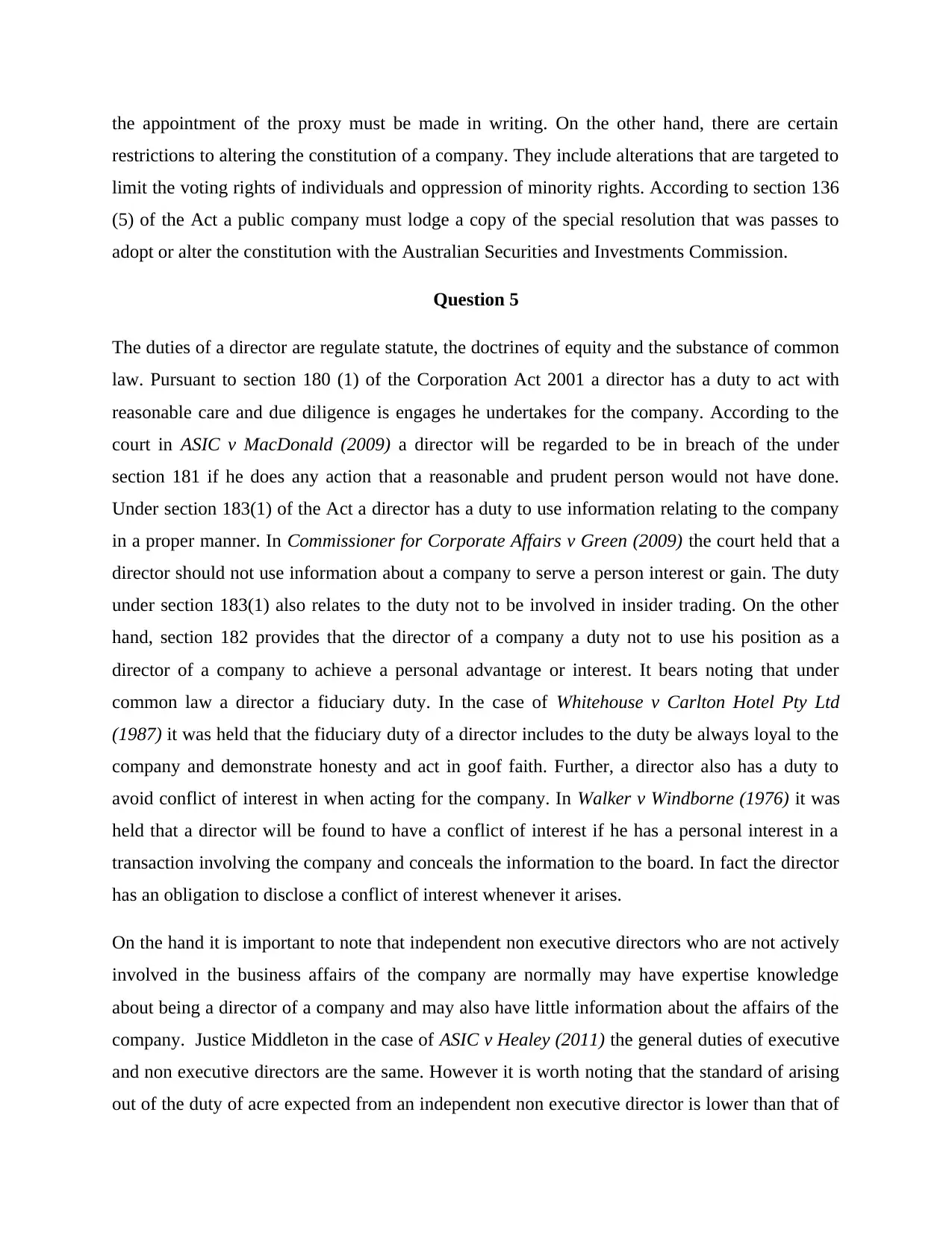
the appointment of the proxy must be made in writing. On the other hand, there are certain
restrictions to altering the constitution of a company. They include alterations that are targeted to
limit the voting rights of individuals and oppression of minority rights. According to section 136
(5) of the Act a public company must lodge a copy of the special resolution that was passes to
adopt or alter the constitution with the Australian Securities and Investments Commission.
Question 5
The duties of a director are regulate statute, the doctrines of equity and the substance of common
law. Pursuant to section 180 (1) of the Corporation Act 2001 a director has a duty to act with
reasonable care and due diligence is engages he undertakes for the company. According to the
court in ASIC v MacDonald (2009) a director will be regarded to be in breach of the under
section 181 if he does any action that a reasonable and prudent person would not have done.
Under section 183(1) of the Act a director has a duty to use information relating to the company
in a proper manner. In Commissioner for Corporate Affairs v Green (2009) the court held that a
director should not use information about a company to serve a person interest or gain. The duty
under section 183(1) also relates to the duty not to be involved in insider trading. On the other
hand, section 182 provides that the director of a company a duty not to use his position as a
director of a company to achieve a personal advantage or interest. It bears noting that under
common law a director a fiduciary duty. In the case of Whitehouse v Carlton Hotel Pty Ltd
(1987) it was held that the fiduciary duty of a director includes to the duty be always loyal to the
company and demonstrate honesty and act in goof faith. Further, a director also has a duty to
avoid conflict of interest in when acting for the company. In Walker v Windborne (1976) it was
held that a director will be found to have a conflict of interest if he has a personal interest in a
transaction involving the company and conceals the information to the board. In fact the director
has an obligation to disclose a conflict of interest whenever it arises.
On the hand it is important to note that independent non executive directors who are not actively
involved in the business affairs of the company are normally may have expertise knowledge
about being a director of a company and may also have little information about the affairs of the
company. Justice Middleton in the case of ASIC v Healey (2011) the general duties of executive
and non executive directors are the same. However it is worth noting that the standard of arising
out of the duty of acre expected from an independent non executive director is lower than that of
restrictions to altering the constitution of a company. They include alterations that are targeted to
limit the voting rights of individuals and oppression of minority rights. According to section 136
(5) of the Act a public company must lodge a copy of the special resolution that was passes to
adopt or alter the constitution with the Australian Securities and Investments Commission.
Question 5
The duties of a director are regulate statute, the doctrines of equity and the substance of common
law. Pursuant to section 180 (1) of the Corporation Act 2001 a director has a duty to act with
reasonable care and due diligence is engages he undertakes for the company. According to the
court in ASIC v MacDonald (2009) a director will be regarded to be in breach of the under
section 181 if he does any action that a reasonable and prudent person would not have done.
Under section 183(1) of the Act a director has a duty to use information relating to the company
in a proper manner. In Commissioner for Corporate Affairs v Green (2009) the court held that a
director should not use information about a company to serve a person interest or gain. The duty
under section 183(1) also relates to the duty not to be involved in insider trading. On the other
hand, section 182 provides that the director of a company a duty not to use his position as a
director of a company to achieve a personal advantage or interest. It bears noting that under
common law a director a fiduciary duty. In the case of Whitehouse v Carlton Hotel Pty Ltd
(1987) it was held that the fiduciary duty of a director includes to the duty be always loyal to the
company and demonstrate honesty and act in goof faith. Further, a director also has a duty to
avoid conflict of interest in when acting for the company. In Walker v Windborne (1976) it was
held that a director will be found to have a conflict of interest if he has a personal interest in a
transaction involving the company and conceals the information to the board. In fact the director
has an obligation to disclose a conflict of interest whenever it arises.
On the hand it is important to note that independent non executive directors who are not actively
involved in the business affairs of the company are normally may have expertise knowledge
about being a director of a company and may also have little information about the affairs of the
company. Justice Middleton in the case of ASIC v Healey (2011) the general duties of executive
and non executive directors are the same. However it is worth noting that the standard of arising
out of the duty of acre expected from an independent non executive director is lower than that of
Paraphrase This Document
Need a fresh take? Get an instant paraphrase of this document with our AI Paraphraser
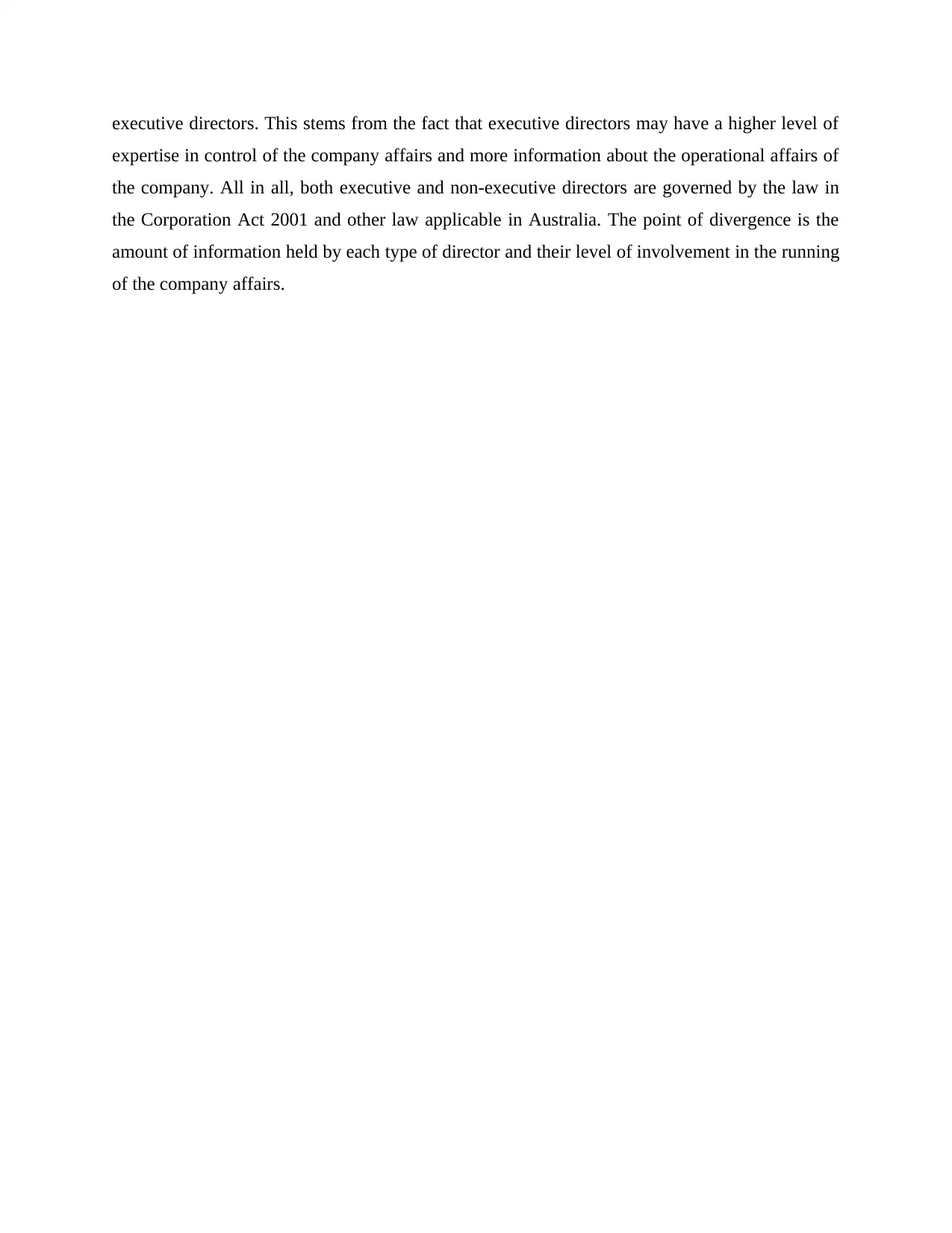
executive directors. This stems from the fact that executive directors may have a higher level of
expertise in control of the company affairs and more information about the operational affairs of
the company. All in all, both executive and non-executive directors are governed by the law in
the Corporation Act 2001 and other law applicable in Australia. The point of divergence is the
amount of information held by each type of director and their level of involvement in the running
of the company affairs.
expertise in control of the company affairs and more information about the operational affairs of
the company. All in all, both executive and non-executive directors are governed by the law in
the Corporation Act 2001 and other law applicable in Australia. The point of divergence is the
amount of information held by each type of director and their level of involvement in the running
of the company affairs.
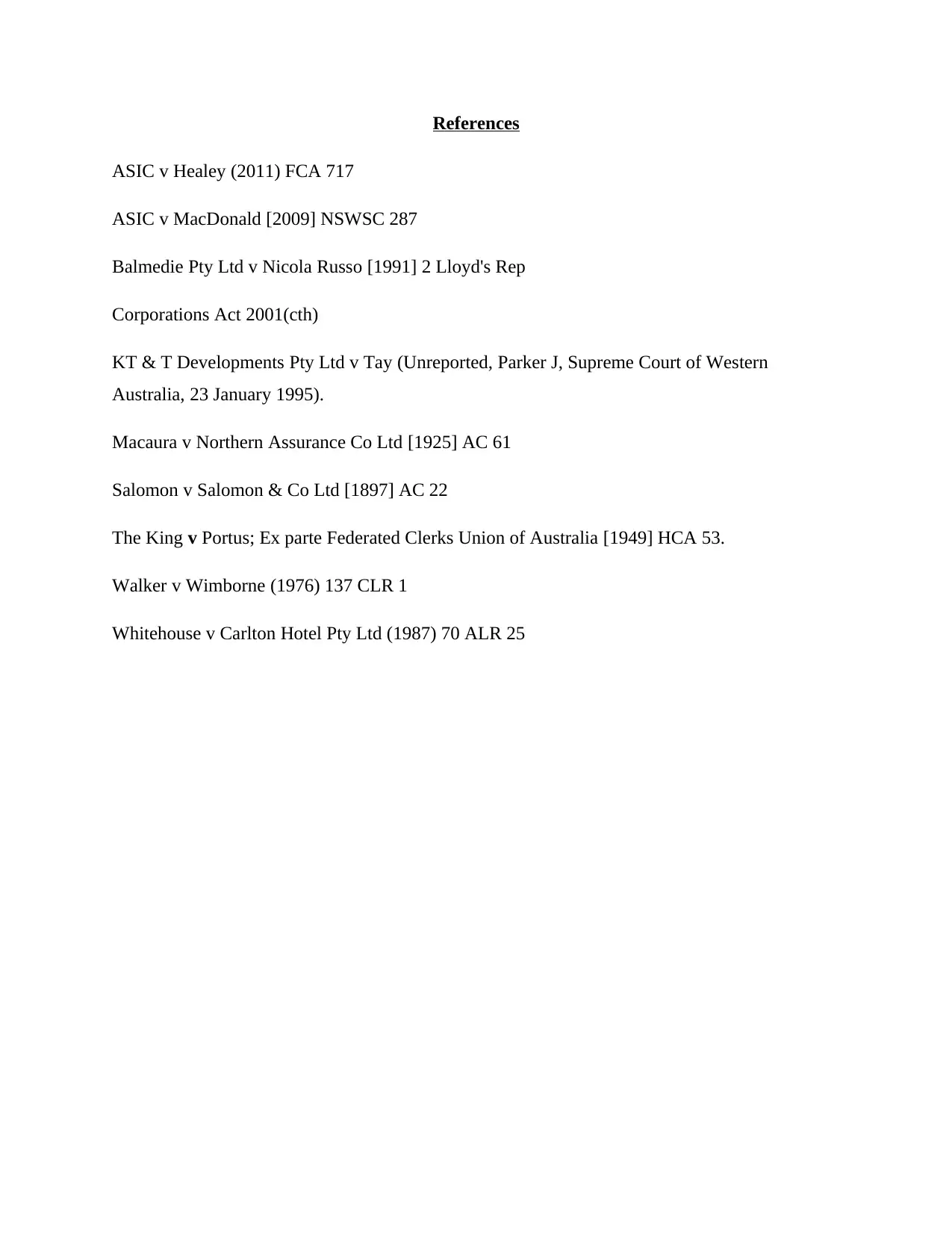
References
ASIC v Healey (2011) FCA 717
ASIC v MacDonald [2009] NSWSC 287
Balmedie Pty Ltd v Nicola Russo [1991] 2 Lloyd's Rep
Corporations Act 2001(cth)
KT & T Developments Pty Ltd v Tay (Unreported, Parker J, Supreme Court of Western
Australia, 23 January 1995).
Macaura v Northern Assurance Co Ltd [1925] AC 61
Salomon v Salomon & Co Ltd [1897] AC 22
The King v Portus; Ex parte Federated Clerks Union of Australia [1949] HCA 53.
Walker v Wimborne (1976) 137 CLR 1
Whitehouse v Carlton Hotel Pty Ltd (1987) 70 ALR 25
ASIC v Healey (2011) FCA 717
ASIC v MacDonald [2009] NSWSC 287
Balmedie Pty Ltd v Nicola Russo [1991] 2 Lloyd's Rep
Corporations Act 2001(cth)
KT & T Developments Pty Ltd v Tay (Unreported, Parker J, Supreme Court of Western
Australia, 23 January 1995).
Macaura v Northern Assurance Co Ltd [1925] AC 61
Salomon v Salomon & Co Ltd [1897] AC 22
The King v Portus; Ex parte Federated Clerks Union of Australia [1949] HCA 53.
Walker v Wimborne (1976) 137 CLR 1
Whitehouse v Carlton Hotel Pty Ltd (1987) 70 ALR 25
⊘ This is a preview!⊘
Do you want full access?
Subscribe today to unlock all pages.

Trusted by 1+ million students worldwide
1 out of 6
Related Documents
Your All-in-One AI-Powered Toolkit for Academic Success.
+13062052269
info@desklib.com
Available 24*7 on WhatsApp / Email
![[object Object]](/_next/static/media/star-bottom.7253800d.svg)
Unlock your academic potential
Copyright © 2020–2026 A2Z Services. All Rights Reserved. Developed and managed by ZUCOL.





